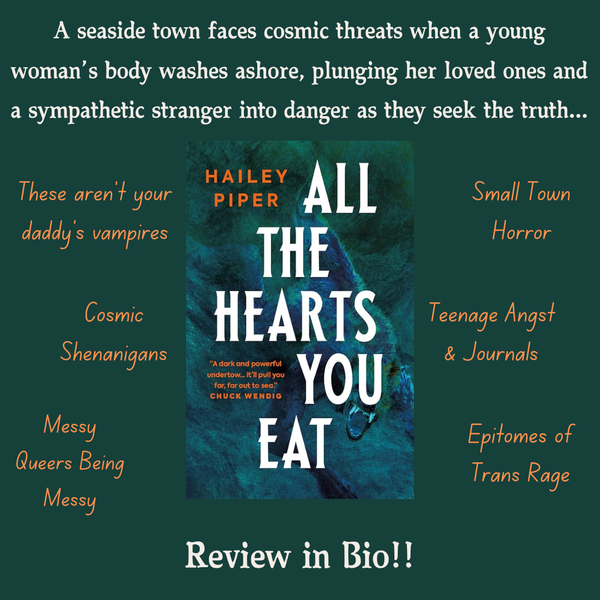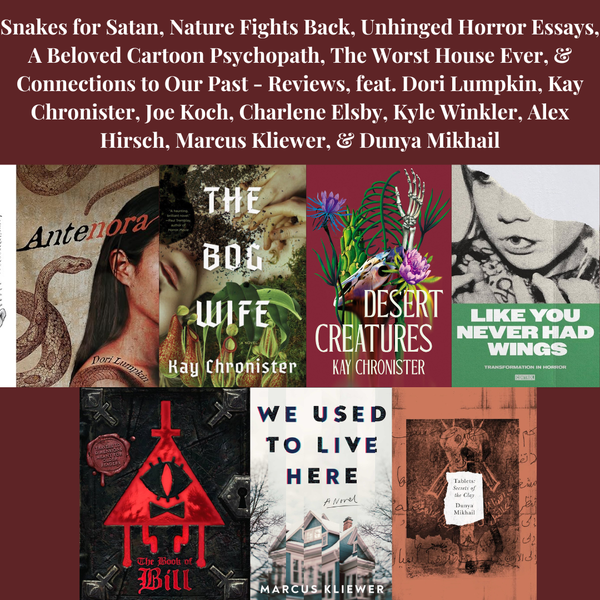Poetry Roundup feat. Kaveh Akbar, Noor Hindi, Emily August, & Danez Smith
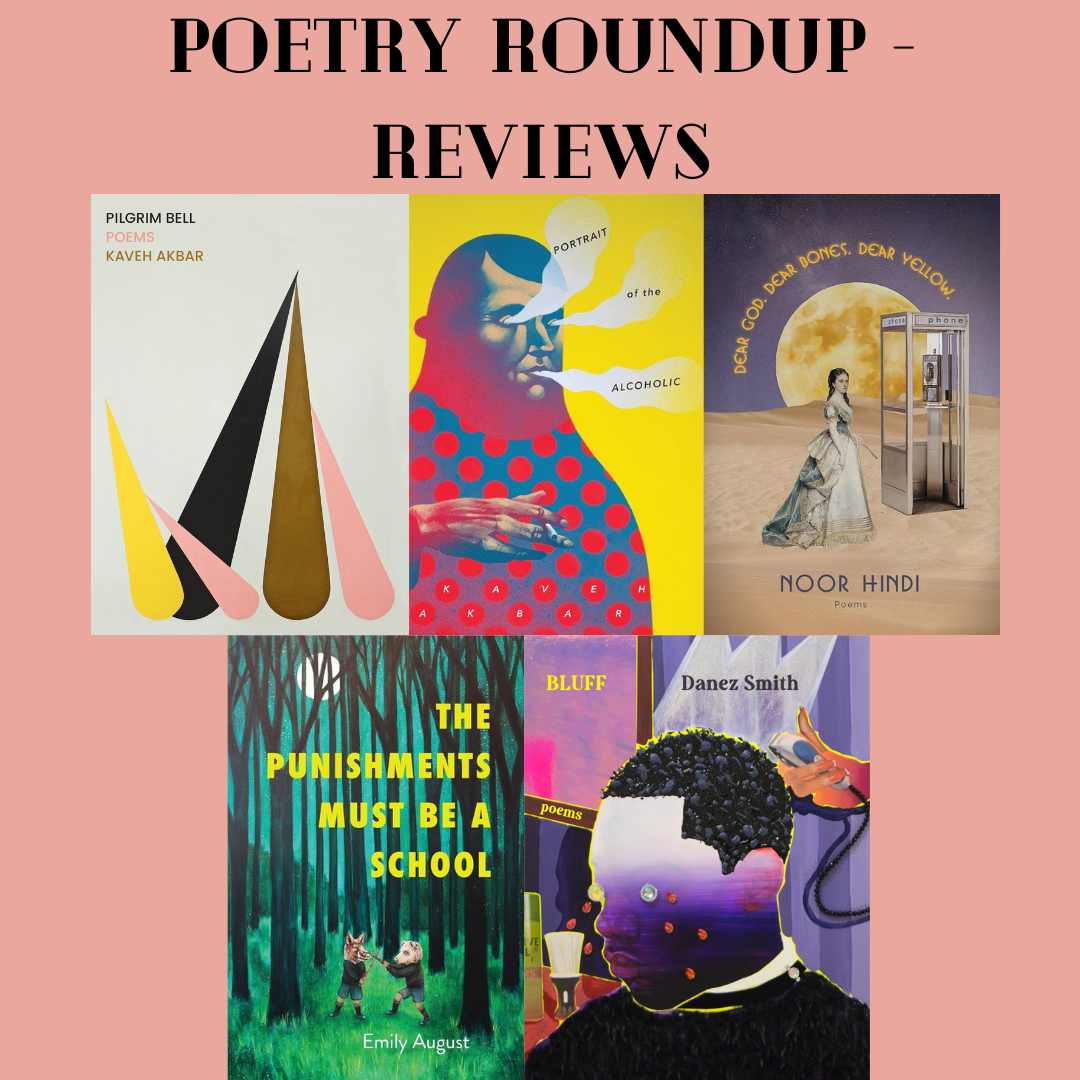
I haven't discussed poetry much in my reviews (on here) yet. This is in part due to a feeling that I can never adequately describe what makes particular collections so fantastic, which saddens me because I LOVE poetry!!
To help rectify this, I'm going to push myself more to review poetry, because there are some excellent collections out there, past and present. These are a few of my recent favorites, with a special upcoming title!
Let's get introspective.
Pilgrim Bell and Portrait of the Alcoholic by Kaveh Akbar, Graywolf Press & Sibling Rivalry Press
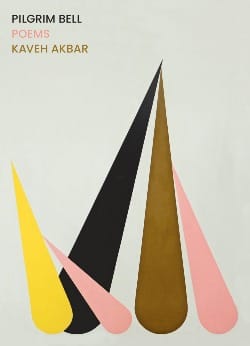
My first engagement with Kaveh Akbar's incredible poetry was a few years ago. I found Calling a Wolf a Wolf listed amongst other great collections in the queer poetry category. I was struck by Akbar's imagery, the use of wolf archetypes as a vehicle for topics of alcoholism, faith, and queerness alike. I had wanted to dig deeper, but lost track of his current releases, until my love and attention was reignited by this year's, Martyr!.
With my absolute admiration for his debut novel, I decided to delve into his past work again, getting Pilgrim Bell, the most recent collection, and Portrait of the Alcoholic, Akbar's debut chapbook. Pilgrim Bell finds the poetic voice further exploring themes of spiritual searching, hope, and even redemption amidst a world using faith and prejudice as weapons for white supremacy.
Akbar brings the speakers of each poem together in shared voices, lilting in gorgeous verse. Each voice rings with power as much as it does heart and care. There are poems as calls to action, poems as theory, but always poems of love. Where Calling a Wolf a Wolf may have featured a sense of grief and pain, Pilgrim Bell shines with healing and hope.
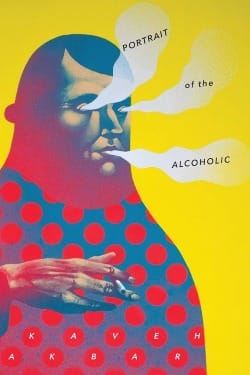
Now, going backward in time, there's Portrait of the Alcoholic, Akbar's debut collection. Not quite as meditative as Calling a Wolf a Wolf, there remains the blueprints for his further work, leading even to Martyr!. Throughout this collection there is a dialogue with the speaker as The Alcoholic, becoming their own character as a means of catharsis and introspection.
Much like its predecessors, Portrait of the Alcoholic sings with Akbar's signature voice, serving as a unique look back for me, having read the others first. There's an almost playful sensibility hidden between the more somber tones, creating its own complex kaleidoscope of emotion. If you've read Akbar before, but haven't given this particular collection your time, it's absolutely a must read, as it speaks in definite concert with the rest of his repertoire, as well as pairing nicely with Pilgrim Bell as a sequence of growth.
DEAR GOD. DEAR BONES. DEAR YELLOW. by Noor Hindi, Haymarket Books

If you've been looking for reading that offers contemporary voices concerning Palestinian experience, may I suggest DEAR GOD. DEAR BONES. DEAR YELLOW. by the insanely talented Noor Hindi.
Within this enraged and emphatic collection, Hindi asks us a series of important questions: What is political poetry and linguistic activism? What does it mean to bear witness through writing? When language proves insufficient, how do we find and articulate a pathway forward? For writers, this remains an intensely important question. If we're not using our gifts as a means of leading readers to specific and important emotions and experiences, how may that make us complicit or even ignorant to the violence of empire?
While this collection by no means asserts itself as the absolute answer to these questions, Hindi does her god damnedest to expand and subvert each question, calling upon the craft of poetry itself as a vessel for change. What does writing poetry, a fairly political act in and of itself, mean in the world of activism? In theory? In community building? Each poem does its best to approach each question with snarling defiance just as much as it does so with serene poise.
For example, the poem that was most circulated from this book is titled "Fuck Your Lecture on Craft, My People Are Dying." Bursting with the rage of a country that has been forced to contend with genocide for over hundreds of years, there's an additional confrontation with what it means to move through a structure such as academia while those meant to educate you could not care less about the unimaginable violence back home.
What does craft even matter in a medium as creative and experimental as poetry? Hindi defiantly plays with the tools of poetic craft, daring anyone foolish enough to challenge her merit beside the dusty imagery of poetry past. These poems have no interest in being or sounding pretty, rather prompting their reader to actually listen and consider the horrors within. But do not mistake said lack of interest to mean that these poems do not hold a radical, brutal beauty to them. Her subversion of form is enthralling, lending lyricism to its cutting wit.
The Punishments Must Be a School by Emily August, The Word Works
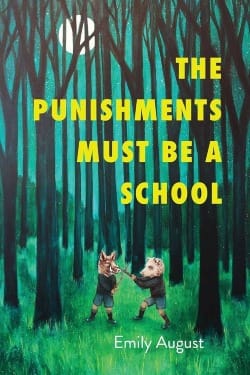
If there's one aspect of social media I truly love, it's getting to see what other people are reading. More often than not, this has led me to some of my favorite books. This was especially the case when I saw a post from the spectacular Addie Tsai (@addiewearshistory) shouting out Emily August's debut collection, The Punishments Must Be a School.
Using a folkloric, almost fairytale tone, August tells a harrowing alternate (hardly) history of education's unfortunate ties to white supremacy, displaying the roots of what led to carceral punishment as a means of disciplining children. We follow several voices brought to the colonies, witnessing the slow yet steady rise of punishment as a means of teaching lessons, tinting each poem in its own mythological darkness that rests right at the edge.
Through the various speakers, we see this fracturing world through the eyes of children, who grow to be adults trying their best to not inflict the same violence upon their loved ones. August brings the threads together with a storyteller's precision, providing the moral of a fable or fairytale but with a voice of social justice.
This is not to demonize education as a whole, but rather the harmful structures with which many of these institutions were built upon, as well as whom is harmed the most from them–I likely don't need to supply any hints at this point. Brazen and beautiful, these poems morph and shift like smoke coming off a lake, deploying rage and affecting innocence when it must.
The Punishments Must Be a School is an utterly astounding debut, laying the groundwork for a career we all must pay attention to.
Bluff by Danez Smith, Graywolf Press
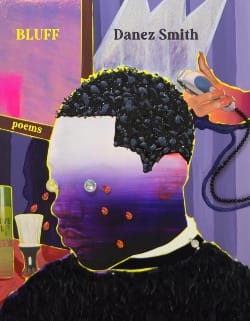
As I set to writing this review, I realized that I need to search and see if anyone has written any academic papers of Danez Smith's poetry. Because god damn, their work is some of my favorite, and NEEDS to be studied/engaged with.
A few weeks ago, Smith posted that ARCs were now available for their upcoming collection, Bluff, so I jumped at that immediately. My overwhelming thanks, again, to Graywolf Press for sending me a copy. I appreciate it more than you know.
Smith's first since their explosive 2020 ode to Black joy, Homie, Bluff barks with a sharper edge, while maintaining an ever-present hope. Responding to the consistent rise in racial violence, alongside the pain and isolation of COVID, these poems are as much of a beacon as they are a battlement. Smith recounts the darkest days of marching for the countless lives we lost during these pandemic years, simultaneously grieving and picturing a world in which these larger systems are dismantled and Black suffering is not viewed as currency.
Additionally, they continue to push the bounds of form, deploying many prose poems, as well as other unique formats for their powerful stanzas. One particular standout is a poem that appears as a large QR code that leads you to the actual piece, functioning as its own conversation.
To witness Smith's growth from the stellar debut of [Insert] Boy, to the clarion call of this triumphant new collection, is nothing short of awe-inspiring. While the writing takes new forms and shapes, the voices are still uniquely Danez, shining with a humor, passion, and righteous anger that speaks to Chicago and beyond. We're still several months out from Bluff's official release, but once it does, you will want to grant time to its wisdom.
And there we have it. Several poetry collections that you should totally read as soon as you are able. These are poets and voices that have fundamentally altered my brain chemistry at different points over the course of the last few years and months. I hope that my talking about them not only made sense, but also maybe got you a little excited to read them.
Poetry remains a powerful medium with which to hear the rallying of the oppressed and revolutionary. Poems hold a very important history as a means of movement building and unfettered expression. These are writers who will challenge you in unique and inspiring ways, all we need to do is listen.
You can find Kaveh Akbar @kavehakbar.kavehakbar on Instagram and Graywolf Press @graywolfpress.
You can find Noor Hindi @noorkhindi on Instagram and Haymarket Books @haymarketbooks.
You can find Emily August @emily_allan_poe on Instagram.
And you can find Danez Smith on Instagram @danez_smif.


